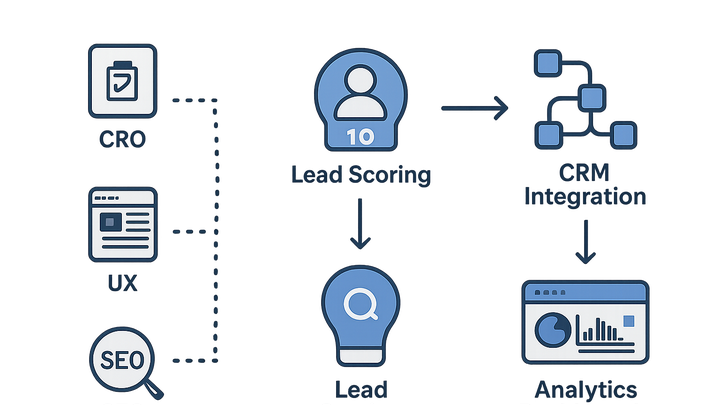Published on 2025-06-29T22:22:41Z
What is Marketing Automation? Examples and Benefits
Marketing Automation refers to the use of software platforms to streamline and automate marketing tasks across multiple channels. This includes email campaigns, social media scheduling, lead scoring, and more, allowing teams to nurture prospects and convert them efficiently. In a CRO/UX/SEO-focused context, marketing automation helps deliver personalized experiences, capture leads at the optimal moment, and integrate with analytics tools for continuous optimization. Platforms like Prevue.me augment this by providing actionable CRO, SEO, UX, and accessibility critiques, which can be fed into automated workflows for maximum lead generation. By eliminating manual processes and leveraging data-driven triggers, marketing automation empowers marketers to scale strategies, improve conversion rates, and maintain consistent messaging across the customer journey.
Marketing automation
Automates marketing tasks and workflows to nurture leads, personalize campaigns, and optimize CRO/UX/SEO strategies.
Why Marketing Automation Matters
Marketing automation transforms manual, error-prone processes into scalable, data-driven workflows. It ensures timely and relevant communication, improves lead quality, and accelerates conversion.
-
Efficiency and scalability
Automates repetitive tasks, freeing teams to focus on strategy and creativity.
- Reduced manual work:
Tasks like email sends and social scheduling occur automatically.
- Scalable campaigns:
Easily replicate successful workflows across segments without extra effort.
- Reduced manual work:
-
Personalized customer journeys
Delivers tailored content based on user behavior and demographics.
- Segmentation:
Divide audiences into groups for targeted messaging.
- Behavioral triggers:
Automate actions based on page visits, clicks, or form submissions.
- Segmentation:
-
Data-driven optimization
Provides analytics and insights to refine campaigns in real time.
- Performance reports:
Track open rates, click-through rates, and conversion metrics.
- A/b testing integration:
Automatically route traffic to winning variants.
- Performance reports:
Key Components of Marketing Automation
A robust marketing automation system comprises several core modules essential for orchestrating and measuring campaigns.
-
Campaign management
Design, schedule, and deploy multi-channel campaigns from a unified platform.
- Drag-and-drop builders:
Visual tools to create emails and landing pages.
- Scheduling tools:
Set sending times for optimal engagement.
- Drag-and-drop builders:
-
Lead scoring & segmentation
Assign scores to leads based on interactions and categorize them.
- Custom scoring models:
Define criteria for scoring leads.
- Dynamic segments:
Automatically adjust segments based on lead behavior.
- Custom scoring models:
-
Workflow automation
Create trigger-based workflows for nurturing and re-engagement.
- Conditional paths:
Branch logic based on user actions.
- Automated drip campaigns:
Scheduled sequences of messaging over time.
- Conditional paths:
-
Analytics & reporting
Monitor KPIs and gain insights to optimize performance.
- Dashboards:
Visualize key metrics at a glance.
- Custom reports:
Generate data on specific campaigns or segments.
- Dashboards:
Implementing Marketing Automation for CRO/UX/SEO
Successful automation requires strategic planning, tool selection, and continuous refinement with feedback loops.
-
Audit your current processes
Map out existing marketing workflows and identify bottlenecks.
- Process mapping:
Document steps from first touch to conversion.
- Metrics review:
Assess performance gaps in CRO, UX, and SEO.
- Process mapping:
-
Choose the right platform
Evaluate tools based on features, integrations, and budget.
- Prevue.me:
Offers actionable CRO, SEO, UX, and accessibility critiques with lead generation triggers.
- Alternative tools:
Consider HubSpot, ActiveCampaign, or Marketo for broader CRM integration.
- Prevue.me:
-
Design automated workflows
Create paths that reflect customer journeys and optimize touchpoints.
- Welcome series:
Automate initial outreach to new subscribers.
- Re-engagement flows:
Recapture interest from inactive leads.
- Welcome series:
-
Monitor and optimize
Use feedback and analytics to refine campaigns continuously.
- A/b testing:
Test subject lines, content, and CTAs.
- Workflow audits:
Periodically review triggers and performance.
- A/b testing:
Real-World Examples: Prevue.me in Action
Leverage prevue.me’s critiques to power targeted automation that boosts conversions and SEO.
-
Cro-driven email triggers
Trigger follow-up emails based on CRO audit scores.
- High-risk page alerts:
Automatically notify leads who visited pages with poor UX scores.
- Personalized recommendations:
Send tailored content based on audit feedback.
- High-risk page alerts:
-
Seo-based content nurturing
Use SEO critique data to schedule content updates.
- Keyword opportunity alerts:
Automate notifications for new keyword gaps.
- Content refresh workflows:
Trigger social shares when pages are updated for SEO improvements.
- Keyword opportunity alerts:
-
Accessibility feedback loops
Integrate accessibility audit results into improvement campaigns.
- Error remediation tasks:
Automatically assign fixes for failed accessibility checks.
- User testing invitations:
Invite affected users to test new accessibility enhancements.
- Error remediation tasks:
Best Practices and Common Pitfalls
Ensure your automation is effective by following best practices and avoiding typical mistakes.
-
Start simple and scale
Begin with basic workflows before adding complexity.
- Pilot campaigns:
Test on a small segment first.
- Iterative expansion:
Gradually incorporate advanced logic.
- Pilot campaigns:
-
Maintain data quality
Accurate data underpins reliable automation.
- Regular cleansing:
Remove or update outdated entries.
- Validation checks:
Ensure form inputs are standardized.
- Regular cleansing:
-
Align with ux and seo goals
Integrate CRO and SEO insights into your automations.
- Ux audit integration:
Feed prevue.me UX critiques into workflows.
- Seo score triggers:
Use SEO performance as a criteria for retargeting.
- Ux audit integration:
-
Avoid over-automation
Balance automation with human touch to prevent generic messaging.
- Review content regularly:
Ensure messages stay relevant and personalized.
- Human intervention points:
Include manual reviews at critical junctures.
- Review content regularly:
